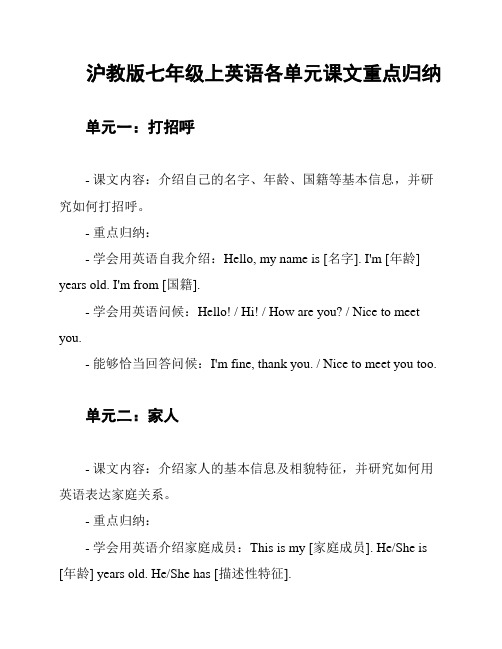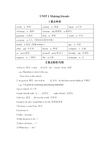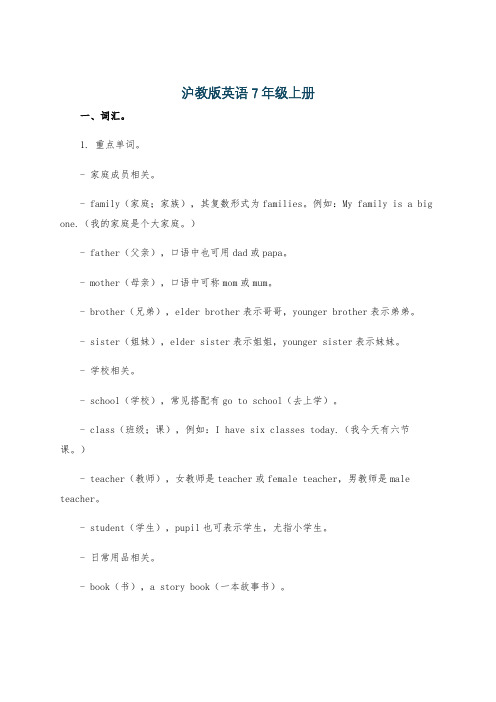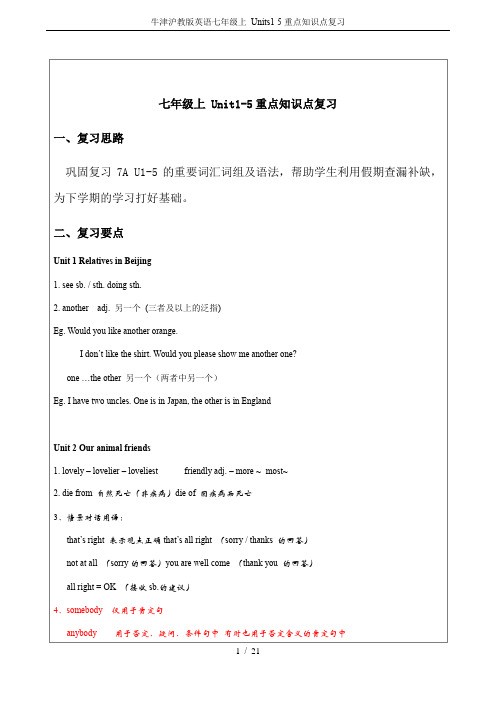沪教版七年级上英语各单元必考知识点汇编
沪教版初中英语七年级上册知识点

Unit 1知识梳理Unit 2知识梳理Unit 3知识梳理重点词组1.on Earth 在地球上2.stop doing 停止做某事3.provide...with... 为……提供……4.put...into... 把……倒入……5.throw away 扔掉6.lift...up 将……抬起7.keep...alive 让……活着重点句型:1.there be (is/are)….2. some are…and some are….3. it is + adj + for sb + to do …4. make/keep + adj可数vs 不可数名词可数名词:集体名词如:people,单复数同形名词如:sheep、fish、deer等常考不可数名词:music, news, paper, advice, information, weather可数、不可数名词的数量修饰:some, many / much, a lot of, a few / little , few / little 等There be 句型There is + 单数可数名词/不可数名词There are + 复数可数名词“就近原则”原则:动词be的形式要和最靠近它的主语在数上保持一致;另外,还必须注意不可数名词用作主语时,动词be应用单数形式。
例:There is a book and some pens on the desk拓展:there be(某地有某物)与have/has(某人有…) 的用法区别“There be…”句式和have均可表示“有”的意思,但用法有别。
“There be…”表示“在某处有……”,意为“存在有”;而have却表示“某人/某物有……”,意为“某人/某物拥有……”。
Unit 4知识梳理Unit 5知识梳理Unit 6知识梳理。
沪教牛津版英语七年级上册单元知识点一览表

address、(be) famous for、department store、prefer to、go on holiday、go sightseeing
1、情态动词can,may,must的学习与运用
单元标题
页码范围
Module 4 Colourful life ( P87-116 ) 单元重点词汇
单元语法点分析
7 Poems
P87-102
poem、ordinary、feeling、order、advice、aloud、group、agree、disagree、*rhyme、 complete、well、shower、*site、narrow、height、superman、seller、smile、rush、 1、祈使句和感叹句的学习和运用
person、cheerful、hard-working、patient、smart、probably、forget、smell、care、 miss、joke、laugh、remain、strict、encourage、support、successful、member as well、take care of、make fun of、(be) strict about、give up、go to work
1、量词词组的学习与运用 2、How much和How many的学习与运用
6 Electricity
P71-86
沪教版七年级上英语各单元课文重点归纳

沪教版七年级上英语各单元课文重点归纳单元一:打招呼- 课文内容:介绍自己的名字、年龄、国籍等基本信息,并研究如何打招呼。
- 重点归纳:- 学会用英语自我介绍:Hello, my name is [名字]. I'm [年龄] years old. I'm from [国籍].- 学会用英语问候:Hello! / Hi! / How are you? / Nice to meet you.- 能够恰当回答问候:I'm fine, thank you. / Nice to meet you too.单元二:家人- 课文内容:介绍家人的基本信息及相貌特征,并研究如何用英语表达家庭关系。
- 重点归纳:- 学会用英语介绍家庭成员:This is my [家庭成员]. He/She is [年龄] years old. He/She has [描述性特征].- 学会用英语表达家庭关系:father, mother, brother, sister, etc.单元三:爱好- 课文内容:研究如何用英语表达自己的爱好,并了解他人的爱好。
- 重点归纳:- 学会用英语表达自己的爱好:I like [爱好]. / My hobby is [爱好].- 学会用英语询问他人的爱好:What's your hobby? / Do you like [爱好]?- 能够恰当回答他人的爱好:Yes, I do. / No, I don't.单元四:学校生活- 课文内容:介绍学校的地理位置、教学设施等,并研究如何用英语表达日常学校生活。
- 重点归纳:- 学会用英语描述学校的位置:My school is [位置].- 学会用英语表达教学设施:There is/are [设施] in my school.- 学会用英语表达日常学校生活:I have [科目] on [星期]. / I study [科目] at school.单元五:时间和日期- 课文内容:研究如何用英语询问时间和日期,并表达个人安排。
最新沪教版七年级英语上册知识点

III详细讲解1.Read a German girl’s blog。
(1)German :① adj.德国的(德国人的,德语的)This is a German car。
② n.德国人,是可数名词。
复数形式要在后面加“s”。
德语,是不可数名词。
e.g.: Germans speak German。
◎中国China,中国人/中文Chinese;日本Japan,日本人/日语Japanese;法国France,法国人/法语French;英国England/Britain/U.K. 英国人/英语English(2)girl’s是名词“girl”的所有格形式,意为“女孩的···”所有格:在名词后加上“’s”构成所有格,表示一种所属关系,表示“···的”它的构成有以下方式:①一般情况下在名词词尾加“’s” e.g.: Tom’s books 汤姆的书②以-s结尾的复数名词的所有格,一般在其后面直接加“’”即可。
e.g.: parents’ names 父母的名字;Teachers’ Day 教师节③表示两人或多人各自的所属关系,要在各个词尾分别加“’s”;表示两人或多人共同的所属关系,只需要在最后一个词的词尾加“’s”。
e.g.: Lily’s and Linda’s bikes。
丽丽和琳达的自行车.(注意:两人各有一辆车)Lily and Linda’s room。
丽丽和琳达的房间。
(注意:两人共住一间房)④表示某人的家、店铺、办公室时,常省略“’s”后面的名词house,shop,office 等。
At my uncle’s = at my uncle’s home 在我叔叔家2.I’m from Germany. =I come from Germany.come from =be from 来自 e.g.: I’m from China.3.I have an elder sister and an elder brother.①Elder :形容词,“年长的”。
沪教版英语7年级上册

沪教版英语7年级上册一、词汇。
1. 重点单词。
- 家庭成员相关。
- family(家庭;家族),其复数形式为families。
例如:My family is a big one.(我的家庭是个大家庭。
)- father(父亲),口语中也可用dad或papa。
- mother(母亲),口语中可称mom或mum。
- brother(兄弟),elder brother表示哥哥,younger brother表示弟弟。
- sister(姐妹),elder sister表示姐姐,younger sister表示妹妹。
- 学校相关。
- school(学校),常见搭配有go to school(去上学)。
- class(班级;课),例如:I have six classes today.(我今天有六节课。
)- teacher(教师),女教师是teacher或female teacher,男教师是male teacher。
- student(学生),pupil也可表示学生,尤指小学生。
- 日常用品相关。
- book(书),a story book(一本故事书)。
- pen(钢笔),pencil(铅笔),eraser(橡皮擦),ruler(尺子)等都是学习中常用的文具。
2. 词汇拓展。
- 形容词变副词。
- 一般情况下,形容词 + -ly变成副词。
例如:quick(快的) - quickly(快地);careful(仔细的) - carefully(仔细地)。
- 以“y”结尾的形容词,先变“y”为“i”,再加 -ly。
如:happy(快乐的)- happily(快乐地)。
二、语法。
1. 一般现在时。
- 用法。
- 表示经常或习惯性的动作或状态。
例如:I get up at six every day.(我每天六点起床。
)- 表示客观事实或真理。
The earth goes around the sun.(地球绕着太阳转。
沪教牛津版英语七年级上册知识点总结

Unit 11来自be from=come from2和...住在一起live with...3靠近.. close to=near4艺术老师an Art teacher5姐姐an elder sister6乘车上学go to school by bus / take a bus to school7 擅长be good at doing sth. = do well in doing sth.8交朋友make friends with...9来自世界各地的朋友people from all over the world =around10 发邮件给某人email sb.11 离...很远far away from....12 .....的意思是the meaning of . (13)在某人的空余时间in one’s free time14 …的答案是the answer to …15 一个德国女孩a German girl16 在互联网上on the Internet17 放风筝fly a kite / fly kites18 收到某人来信hear from sb= receive / get a letter from19 最美好祝愿best wishes20 许多朋友a lot of / lots of / many friends21 洗澡take a bath22 想做某事would like to = want to … 23 你多大了?What’s your age?/ How old are you?24 完成complete=finish4. work as + 职位名称作为…而工作6. walk to school=go to school on foot 走路去上学7. be keen on (doing) sth=be interested in 对….感兴趣8. enjoy (doing) sth= like doing sth 喜欢做某事9. reply to sb回信给某人11. a photo of 一张…的图片13. speak Chinese 说中文15. in the middle 在中间20. write to sb写信给某人,注意pay attention to 以…开始begin with 参考书reference book语法1:特殊疑问词及其引导的特殊疑问句(what, where, when, how, why, which)What refers to things.对事物提问(什么)(可以用来询问职业) Where refers to places.对地点提问(在哪里)Who refers to persons.对人提问(谁)How refers to ways.对年龄提问(多大年纪,几岁)How old refers to ages.对某人或情况提问(怎么样)When refers to times.对时间提问(何时)what time (只能用来问具体几点钟)Why refers to reasons.对原因提问(为什么)which refers to kinds (种类).对事物或人称提问(哪一个,哪一位)How many refers numbers.对数量提问(多少)How old ...多大年纪How often ... 多经常,多久一次How far... 多远How long ... 多长时间How soon 多快,多语法2:不定冠词的用法不定冠词有a和an两个,仅用在单数可数名词前。
七年级上册英语知识点总结沪教牛津

U5单词和短语1.be able to do sth. /can 同义转换单选 be(am,is, are,was,were)的形式的考察2.more than/over(U8)同义转换3.have to/must 同义转换两者区别:客观需要/主观看法/have to 有各种时态形式4.breathe/bri:ð/V. /breath n. 给单词写单词5.such as…列举整体之中的部分同类人或事物作例,之前一般用逗号和主句隔开,之后没有逗号,直接加名词性短语,相当于like或for example6.without+(doing)sth.=if there is no sth.同义转换10给词填空7.be nervous about/of (doing) sth.8.leave+SP“离开某地”/ leave for+SP“动身去某地”/leave+SP.+for+SP.“离开某地去某地”9.tie (tying) (lie lying die dying)10.work V.“运转,运行” N.工作(不可数)作品(可数)工厂(works)11. in one’s sleep “在某人的睡梦中;在某人睡着的时候”12.a large/small amount of +N[U] 大/少量的13. space 太空(前用零冠词,不可数)14. feel…about… “对……感到……”句型1. Tomorrow I’ll be one of the first students totravel into space.One of+N(复)“......中之一”;first 后接名词复数时“第一批”、“第一组”X Kb1 .C om2.The Moon is around(=about) 380,000 kilometres from the Earth , so it’ll take us about four days to get there. A.对距离提问用how far…;区分how soon…再过多久,对将来的一段时间提问,回答一般是,in+时间段/how often…“隔多久”对频率提问(期末) /how long…“持续多长时间”回答一般是,时间段或for+时间段/how many…/how much… B.It takes(V.花费) sb. some time to do something / doing sth. takes sb. some time/ sb spend some time(或money) doing sth. / on sth./ sth. / sth. costs (sb.) +金钱 (doing) sth. costs (sb.) +时间 C.get(到达)to+SP.“到达某地”接here、there、home时,to要省略。
牛津沪教版英语七年级上 Units1-5重点知识点复习

A. is going to be B. is going to have
C. will have D. are going to be
BAABD CCAAA
II.一般现在时
1.表示现在的状态,经常或者习惯性的动作,客观事实或者存在,主语所具备的性格和能力
5.bake v. baker n. bakery n.
6.cook v.烧饭cook n.厨师cooker n.厨具cookery n.烹饪
do some cooking做饭
7.constructionn.under ~建设中construct v.建造
8.remove v.移去、搬走~ sth.from sp.从…搬走removaln.
2.too+形容词原级+to sb./sth.太…以至于不能
too+形容词原级+for sb.对某人而言太…
3.much + adj./adv.比较级……的多, much修饰adj.的比较级
much more much better much worse
much less much loveliermuch more different
14.blind adj.
The + adj.表示某类人(复数含义)
15.Inmany different ways在很多不同的方面
16. missing adj.失踪的miss v.(1)思念(不在身边的)(2)错过
Unit 3 friends from other countries
1.crowded adj.拥挤的crowd n.人群be crowded with挤满了
- 1、下载文档前请自行甄别文档内容的完整性,平台不提供额外的编辑、内容补充、找答案等附加服务。
- 2、"仅部分预览"的文档,不可在线预览部分如存在完整性等问题,可反馈申请退款(可完整预览的文档不适用该条件!)。
- 3、如文档侵犯您的权益,请联系客服反馈,我们会尽快为您处理(人工客服工作时间:9:00-18:30)。
沪教版七年级上英语各单元必考知识点汇编Unit 1 必考知识点考点一:名词所有格1.Read a German girl’s blog.➢真题链接1、(2013 ·广西贺州)Look at the man over there. He is uncleA.Jim’s and Tim’sB. Jim’s and TimC. Jim and TimD. Jim and Tim’s考点二:零冠词用法2.playing basketball 打篮球(教材第2页)➢真题链接2、(2013·山东泰安)—Do you play piano in your free time? —No, I like sports. I often play soccer with my friends.A.不填;theB. the;不填C. the; theD. a; a考点三:be from知识点3.I’ from Germany.➢真题链接3、(广西桂林中考改编题)Li Yan is my best friend. She is a small village.A.onB. withC. ofD. from考点四:by+交通工具名词的单数名词4.Every day, I go to school by school bus.每天我乘校车去上学。
(教材第3页)➢真题链接4、(2012·贵州毕节)Her mother goes to work bus every morning.A.byB. atC. onD. in考点五:知识点5.Her hobbies 她的爱好(教材第2页)➢真题链接5、(2013 江苏盐城中考)—Do you have any ?—Yes, I like chess and drama best.A. jobsB. dutiesC. hobbiesD. problems考点六:知识点6、I like my school because the teachers are all very friendly.(教材第3页) 真题链接6、(2013 湖北襄阳)—How are you getting along with your new classmates?—Very well. They are all me.A.afraid ofB. friendly toC. angry withD. sorry for考点七:知识点7.I’m good at swimming and playing basketball.(教材第3页)➢真题链接7、(2012 山东临沂)English is my favorite subject, and I am good it.A.forB.toC.atD.ofUnit 1 必考知识点答案解析1、【答案】D【解析】:根据上句Look at the man over there. “看那边那个男人“可知,男人只有一个,由此可以推断这个男人是两人共同的叔叔、Jim’s and Tim’s “吉姆和蒂姆各自的叔叔”。
不符合题意,故选择D2、【答案】B【解析】:play 后接表示球类运动的名词时,球类运动名词前不加任何冠词;play后接乐器类名词时必须加定冠词the piano意为“钢琴”,属于乐器名词,前面要用定冠词the; soccer意为“足球”,属于球类名词,前面不加冠词,故选B。
3、【答案】D【解析】:由句意“李燕是我最好的朋友,她来自于一个小村庄”可知,此处用介词from, be/come from意为“来自”4、【答案】A【解析】:句意为“她妈妈每天早晨坐公共汽车去上班“。
介词on 和In 也可以表示交通方式,但其后的名词前必须有限定词,空格后的名词bus 无限定词修饰,故排除C、D两项;介词at不能表示交通方式,也排除。
by bus为规定搭配,意为“乘坐公共汽车“。
故选A。
5、【答案】C 【解析】:根据“我最喜欢棋类和戏剧”可以推测问句应是问“爱好”,hobby意为“爱好”,与句意相符。
Job“工作”;duty“职责”;problem “问题”,都不符合题意,故选C6、【答案】B【解析】:be afraid of “害怕…….”;be friendly to “对……友好”;be angry with “和……生气”;be sorry for “对……难过”。
根据“你和你的新同学相处得怎么样?”和“非常好。
”可以推测“他们对我很友好”,故选B7、【答案】C 【解析】:由“英语是我最喜爱的学科”可推知“我擅长英语”,be good at为固定短语,意为“擅长”,故选CUnit2 必考知识点考点一:连词so知识点1、My school is close to my home, so I always go to school on foot.我的学校离我家很近,所以我总是不行去上学。
(教材第17页)1、(2012·北京)There are no buses, y ou’ll have to walk.A. soB. orC. butD.for考点二:be different from知识点2.I enjoy learning about different places in the world.我喜欢了解世界上不同的地方。
(教材第17页)2、(河北中考)This school is different others. It has many out-of-class activities.A. offB. fromC. ofD. for考点三:How引导感叹句3.How short it is!休息时间多么短啊!(教材第17页)➢真题链接3、(2012·广东河源中考改编))interesting the book is!A. HowB. WhatC. How anD. What an考点四:between…and…4.between 8 and 9 in the evening 在晚上8点和9点之间(教材第20页)➢真题链接4、(2012·呼和浩特中考改编)The accident happened(发生) 7 p.m.9 p.m.A. from; toB. between; toC. from; andD. between; and考点五:help sb. with sth.知识点5.She sometimes helps me with my homework.有时候她帮我做作业。
(教材第26页)➢真题链接(重庆中考)根据汉语意思完成句子让我们到乡村去帮助孩子们学习。
5.Let’s go to the coun tryside to the kids their study.考点六:by+v.-ing知识点6、People often start by writing “Dear Diary”.人们经常通过写“亲爱的日记”开头。
(教材第27页)6、(2013·重庆)You can improve your English practicing more.A. byB. withC. ofD. inUnit 2 必考知识点答案解析1、【答案】A【解析】:so “因此”;or“或者”;but“但是”;for“因为”。
前半句“没有公共汽车”与后半句“你将不得不步行”之间是因果关系,前面是原因,后面是结果,故选A2、【答案】B【解析】:be different from是固定短语,意为“与……”不同。
3、【答案】A【解析】:本句主语是the book,主语前是形容词interesting,故感叹句how 引导。
句意:这本书多么有趣啊!4、【答案】D【解析】:from...to...和between; and…都是固定短语,前者意为“从……到……”,后者意为“在……和……之间”。
由句意“那次事故发生在晚上7点和9点之间”可知选D5、【答案】help, with【解析】:表示“帮助某人做某事”用help sb. with sth 或help sb. (to) do sth.第二个空后接的是名词短语,故用介词with.6、【答案】A【解析】:by “通过;经由”.表示方式;with“用;和……在一起”;of “属于…的”; in “在……里;用”.由句意“你可以通过多练习提高你的英语水平”可知,by 表示方式,符合题意。
Unit 3 必考知识点知识点一:The Earth provides us with air,water and food.地球为我们提供空气、水和食物。
(教材第31页)➢真题链接1、(2013·黑龙江齐齐哈尔)The charity provides homeless people food and clothes.A. withB. forC.as知识点二:We must stop doing these things.我们必须停止做这些事情。
(教材第31页)➢真题链接2、(2013·湖北孝感)—Dad, why must I stop computer games?—For your health, my boy.A. playB. to playC. playing知识点三:It is important for us to protect the Earth for our future.对我们来说,为了我们的未来保护地球是重要的(教材第31页)➢真题链接3、(2013·四川雅安))It is important people learn team spirit.A. of; ofB. of; toC. for; toD. to; to知识点四:4.I have a world map at home.我家里有一副世界地图。
(教材第35页)➢知识点真题链接4、(2012·浙江温州)—Who’s that man?—Jeremy Lin. He’s American basketball player.A. aB. anC. theD. /知识点五:We can ask people not to eat shark fin soup.我们可以让人们不喝鱼翅汤。
(教材第37页)➢知识点真题链接5、(2013·湖南衡阳)My parents asked me computer games.A.not playingB.not to playC.not play知识点六:Are there any other things we can do?有一些其他我们可以做的事情吗?(教材第38页)➢知识点真题链接6、(2012·贵州安顺)—Would you like to have coffee?—No, thanks. I don’t want drinks now.A. any; anyB. any; someC. some; someD. some; any知识点七:fewer and fewer fish in the sea each year。
